- Home
- Jodi Picoult
The Jodi Picoult Collection #4 Page 23
The Jodi Picoult Collection #4 Read online
Page 23
“If you’re not gone in the next ten seconds, I’m calling 911,” I said.
He grinned at me, a big platinum orthodontically enhanced grin. “I’m not a stranger,” he said. “I’m a friend you haven’t met yet.”
I rolled my eyes. “Why don’t we just cut to the chase—you give me the pamphlets, I politely refuse to talk to you, and then I close the door and throw them in the trash.”
He held out his hand. “I’m Tom.”
“You’re leaving,” I corrected.
“I used to be bitter, too. I’d go to work in the mornings and come home to an empty house and eat half a can of soup and wonder why I had even been put on this earth. I thought I had no one, but myself—”
“And then you offered Jesus the rest of your soup,” I finished. “Look, I’m an atheist.”
“It’s not too late to find your faith.”
“What you really mean is that it’s not too late for me to find your faith,” I answered, scooping up Oliver as he made a mad dash for the open door. “You know what I believe? That religion served its historical purpose—it was a set of laws to live by, before we had a justice system. But even when it starts out with the best of intentions, things get screwed up, don’t they? A group bands together because they believe the same things, and then somehow that gets perverted so that anyone who doesn’t believe those things is wrong. Honestly, even if there was a religion founded on the principle of doing good for other people, or helping them with their personal rights, like I do every day, I wouldn’t join . . . because it would still be a religion.”
I had rendered Tom speechless. This was probably the most heated debate he’d had in months; mostly, he’d have doors closed in his face. Inside my house, the phone began to ring.
Tom pushed a pamphlet into my hand and beat a hasty retreat off my porch. As I closed the door behind him I glanced down at the cover.
GOD + YOU = ∞
“If there’s any math to religion,” I muttered, “it’s division.” I slipped the pamphlet onto the liner of newspaper beneath Oliver’s cage as I hurried to the phone, which was on the verge of rolling over to the answering machine. “Hello?”
The voice was unfamiliar, halting. “Is Maggie Bloom there?”
“Speaking.” I geared up for a zinger to put a telemarketer in her place for disturbing me on a Sunday morning.
As it turned out, she wasn’t a telemarketer. She was a nurse at Concord Hospital, and she was calling because I had been listed as Shay Bourne’s emergency contact, and an emergency had occurred.
Lucius
You would not have believed it possible, but when CO Smythe came back to life, things actually got worse.
The remaining officers had to give statements to the warden about the stabbing. We were kept in lockdown, and the next day a team of officers who did not normally work on I-tier were brought in on duty. They started our one-hour rotations on the exercise yard and the shower, and Pogie was the first to go.
I hadn’t showered since the stabbing, although the COs had given both Shay and me a fresh set of scrubs. We had gotten Smythe’s blood on us, and a quick wash in our cell basins didn’t go very far to making me feel clean. While we were waiting for our turns in the shower, Alma showed up to give us both blood tests. They tested anyone who came in contact with an inmate’s blood, and since that included CO Smythe, his blood apparently was only one step removed from questionable. Shay was moved in handcuffs, ankle cuffs, and a belly chain to a holding room outside the tier, where Alma was waiting.
In the middle of all this, Pogie slipped in the shower. He lay there, moaning about his back. Two more COs dragged in the backboard and handcuffed Pogie to it, then carried him to a gurney so he could be transported all the way to Medical. But because they were not used to I-tier, and because COs are supposed to follow us, not lead, they did not realize that Shay was already being brought back to the tier at the same time Pogie was going out.
Tragedies happen in a split second in prison; that’s all it took for Pogie to use the handcuff key he’d hidden to free himself, jump off the backboard, grab it, and slam it into Shay’s skull, so that he flew face-first into the brick wall.
“Weiss macht!” Pogie yelled—White pride!—which was how I realized Crash—from where he was still being kept in solitary—had used his connections to order a hit on Shay in retaliation for ratting him out and giving his hype kit to the COs. Sully’s attack on CO Smythe had just been collateral damage, meant to shake up the staffing on our tier so that part two of the plan could be carried out. And Pogie—a probate—had jumped at the chance to earn his bones by carrying out a murder sanctioned by the Aryan Brotherhood.
Six hours after this fiasco, Alma returned to finish drawing my blood. I was taken to the holding cell and found her still shaken by what had happened, although she would not tell me anything—except that Shay had been taken to the hospital.
When I saw something silver winking at me, I waited until Alma drew the needle from my arm. Then I put my head down between my knees.
“You all right, sugar?” Alma asked.
“Just feeling a little dizzy.” I let my fingers trail along the floor.
If magicians are the best at sleight of hand, then inmates have to be a close second. As soon as I was back in my cell, I pulled my booty out of the seam in my scrubs where I’d hidden it. Pogie’s handcuff key was tiny, shiny, formed from the fastener of a manila envelope.
I crawled beneath my bunk and wriggled the loose brick that concealed my prized possessions. In a small cardboard box were my bottles of paint and my Q-tip brushes. There were packets of candy, too, that I planned to extract pigment from in the future—a half-empty pack of M&M’s, a roll of LifeSavers, a few loose Starbursts. I unwrapped one of the Starbursts, the orange one that tasted like St. Joseph children’s aspirin, and kneaded the square with my thumbs until the taffy became pliable. I pressed the handcuff key into the center, then reshaped a careful square and folded it into its original wrapping.
I did not like the thought of profiting in some way from an incident that had hurt Shay so badly, but I was also a realist. When Shay ran out of his nine lives and I was left alone, I would need all the help I could get.
Maggie
Even if I hadn’t been listed as Shay Bourne’s emergency contact, I would have found him quickly enough at the hospital: he was the only patient with armed guards standing outside his door. I glanced at the officers, then turned my attention to the nurse at the desk. “Is he all right? What happened?”
Father Michael had called me after the attack on CO Smythe and told me Shay hadn’t been hurt. Somewhere between now and then, however, something must have gone drastically wrong. I had tried calling the priest now, but he wasn’t answering his cell—I assumed he was on his way, that he’d been called, too.
If Shay hadn’t been treated at the prison hospital, whatever had happened must’ve been pretty awful. Inmates weren’t moved off-site unless absolutely necessary, because of cost and security. With the hoopla Shay had generated outside the prison walls, it must have been a matter of life or death.
Then again, maybe everything was when it came to Shay. Here I was literally shaking over the news that he’d been seriously injured, when I had spent yesterday filing motions that would streamline his execution.
The nurse looked up at me. “He’s just come back from surgery.”
“Surgery?”
“Yes,” said a clipped British voice behind me. “And no, it wasn’t an appendectomy.”
When I turned around, Dr. Gallagher was standing there.
“Are you the only doctor who works here?”
“It certainly feels that way sometimes. I’m happy to answer your questions. Mr. Bourne is my patient.”
“He’s my client.”
Dr. Gallagher glanced at the nurse and at the armed officers. “Why don’t we go somewhere to talk?”
I followed him down the hall to a small family waiting lounge t
hat was empty. When the doctor gestured for me to take a seat, my heart sank. Doctors only made you sit down when they delivered bad news.
“Mr. Bourne is going to be fine,” Dr. Gallagher said. “At least in terms of this injury.”
“What injury?”
“I’m sorry, I thought you knew—apparently, it was an inmate fight. Mr. Bourne sustained a severe blow to the maxillary sinus.”
I waited for him to translate.
“His maxilla’s broken,” Dr. Gallagher said, and he leaned forward, touching my face. His fingers brushed over the bone below my eye socket, tracing toward my mouth. “Here,” he said, and I absolutely, positively stopped breathing. “There was a bit of a trauma during the operation. As soon as we saw the injuries we knew that the anesthesia would be intravenous, instead of inhalational. Needless to say, when Mr. Bourne heard the anesthesiologist say that she’d begun Sodium Pentothal drip, he grew quite agitated.” The doctor looked up at me. “He asked if this was a dry run for the real thing.”
I tried to imagine how it would feel to be Shay—hurt, aching, and confused—whisked away to an unfamiliar place for what seemed to be a prelude to his own execution. “I want to see him.”
“If you can tell him, Ms. Bloom, that if I’d realized who he was—what his circumstances are, I mean—well, I would never have allowed the anesthesiologist to use that drug, much less an IV tube. I’m deeply sorry for putting him through that.”
I nodded and stood up.
“One more thing,” Dr. Gallagher said. “I really admire you. For doing this sort of thing.”
I was halfway to Shay’s room when I realized that Dr. Gallagher had remembered my name.
* * *
It took several cell phone calls to the prison before I was allowed in to see Shay, and even then, the warden insisted that the officer inside the room would have to stay. I walked inside, acknowledged the CO, and sat down on the edge of Shay’s bed. His eyes were blackened, his face bandaged. He was asleep, and it made him look younger.
Part of what I did for a living meant championing the causes of my clients. I was the strong arm, fighting on their behalf, the bullhorn broadcasting their voices. I could feel the angry discomfort of the Abenaki boy whose school team was called the Redskins; I could identify with the passion of the teacher who’d been fired for being Wiccan. Shay, though, had sent me reeling. Although this was arguably the most important case I would ever bring to court, and although—as my father pointed out—I hadn’t been this motivated in my career in ages, there was an inherent paradox. The more I got to know him, the better chance I had of winning his organ donation case. But the more I got to know him, the harder it would be for me to see him executed.
I dragged my cell phone out of my purse. The officer’s eyes flicked toward me. “You’re not supposed to use that in here—”
“Oh, piss off,” I snapped, and for the hundredth time I dialed Father Michael, and reached his voice mail. “I don’t know where you are,” I said, “but call me back immediately.”
I had left the emotional component of Shay Bourne’s welfare to Father Michael, figuring (a) my talents were better put to use in a courtroom, and (b) my interpersonal relationship skills had grown so rusty I needed WD-40 before employing them. But now, Father Michael was MIA, Shay was hospitalized, and I was here, for better or for worse.
I stared at Shay’s hands. They were cuffed at the wrist to the metal bars of the hospital gurney. The nails were clean and clipped, the tendons ropy. It was hard to imagine the fingers curled around a pistol, pulling a trigger twice. And yet, twelve jurors had been able to picture it.
Very slowly, I reached across the knobby cotton blanket. I threaded my fingers with Shay’s, surprised at how warm his skin was. But when I was about to pull away, his grip tightened. His eyes slitted open, another shade of blue amid the bruising. “Gracie,” he said, in a voice that sounded like cotton caught on thorns. “You came.”
I did not know who he thought I was. “Of course I came,” I said, squeezing his hand. I smiled at Shay Bourne and pretended that I was the person he needed me to be.
MICHAEL
Dr. Vijay Choudhary’s office was filled with statues of Ganesha, the Hindu deity with a potbellied human body and an elephant’s head. I had to move one in order to sit down, in fact. “Mr. Smythe was extremely lucky,” the doctor said. “A quarter inch to the left, and he wouldn’t have survived.”
“About that . . .” I took a deep breath. “A doctor at the prison pronounced him dead.”
“Between you and me, Father, I wouldn’t trust a psychiatrist to find his own car in a parking lot, much less a hypotensive victim’s pulse. Reports of Mr. Smythe’s death were, as they say, greatly exaggerated.”
“There was a lot of blood—”
“Many structures in the neck can bleed a great deal. To a layman, a pool of blood may look like a huge quantity, even when it’s not.” He shrugged. “What I imagine happened was a vasovagal reaction. Mr. Smythe saw blood and passed out. The body compensates for shock due to blood loss. Blood pressure lowers, and vasoconstriction occurs, and both tend to stop the bleeding. They also lead to a loss of palpable pulses in the extremities—which is why the psychiatrist couldn’t find one in his wrist.”
“So,” I said, pinkening. “You don’t think it’s possible that Mr. Smythe was . . . well . . . resurrected?”
“No,” he chuckled. “Now, in medical school, I saw patients who’d frozen to death, in the vernacular, come back to life when they were warmed up. I saw a heart stop beating, and then start up by itself again. But in neither of those cases—or in Mr. Smythe’s—did I consider the patient clinically dead before his or her recovery.”
My phone began to vibrate, as it had every ten minutes for the past two hours. I’d turned the ringer off when I came into the hospital, as per their policy. “Nothing miraculous, then,” I said.
“Perhaps not by your standards . . . but I think that Mr. Smythe’s family might disagree.”
I thanked him, set the statue of Ganesha back on my chair, and left Dr. Choudhary’s office. As soon as I exited the hospital building, I turned on my cell phone to see fifty-two messages.
Call me right back, Maggie said on her message. Something’s happened to Shay. Beep.
Where are you?? Beep.
Okay, I know you probably don’t have your phone on but you have to call me back immediately. Beep.
Where the fuck are you? Beep.
I hung up and dialed her cell phone. “Maggie Bloom,” she whispered, answering.
“What happened to Shay?”
“He’s in the hospital.”
“What?! Which hospital?”
“Concord. Where are you?”
“Standing outside the ER.”
“Then for God’s sake, get up here. He’s in room 514.”
I ran up the stairs, pushing past doctors and nurses and lab technicians and secretaries, as if my speed now could make up for the fact that I had not been available for Shay when he needed me. The armed officers at the door took one look at my collar—a free pass, especially on a Sunday afternoon—and let me inside. Maggie was curled up on the bed, her shoes off, her feet tucked underneath her. She was holding Shay’s hand, although I would have been hard-pressed to recognize the patient as the man I’d talked to just yesterday. His skin was the color of fine ash; his hair had been shaved in one patch to accommodate stitches to close a gash. His nose—broken, from the looks of it—was covered with gauze, and the nostrils were plugged with cotton.
“Dear God,” I breathed.
“From what I can understand, he came out on the short end of a prison hit,” Maggie said.
“That’s not possible. I was there during the prison hit—”
“Apparently, you left before Act Two.”
I glanced at the officer who stood like a sentry in the corner of the hospital room. The man looked at me and nodded in confirmation.
“I already called Warden Co
yne at home to give him hell,” Maggie said. “He’s meeting me at the prison in a half hour to talk about additional security measures that can be put in place to protect Shay until his execution—when what he really means is ‘What can I do to keep you from suing?’” She turned to me. “Can you sit here with Shay?”
It was a Sunday, and I was utterly, absolutely lost. I was on an unofficial leave of absence from St. Catherine’s, and although I had always known I’d feel adrift without God, I had underestimated how aimless I would feel without my church. Usually at this time, I would be hanging my robes after celebrating Mass. I would go with Father Walter to have lunch with a parishioner. Then we’d head back to his place and watch the preseason Sox game on TV, have a couple of beers. What religion did for me went beyond belief—it made me part of a community.
“I can stay,” I answered.
“Then I’m out of here,” Maggie said. “He hasn’t woken up, not really, anyway. And the nurse said he’ll probably have to pee when he does, and that we should use this torture device.” She pointed at a plastic jug with a long neck. “I don’t know about you, but I’m not getting paid enough for that.” She paused in the doorway. “I’ll call you later. Turn on your damn phone.”
When she left, I pulled a chair closer to Shay’s bed. I read the plastic placard about how to raise and lower the mattress, and the list of which television channels were available. I said an entire rosary, and still Shay didn’t stir.
At the edge of the bed, Shay’s medical chart hung on a metal clip. I skimmed through the language that I didn’t understand—the injury, the medications, his vital statistics. Then I glanced at the patient name at the top of the page:
I. M. Bourne
Isaiah Matthew Bourne. We had been told this at his trial, but I had forgotten that Shay was not his Christian name. “I. M. Bourne,” I said aloud. “Sounds like a guy Trump would hire.”
I am born.
Was this a hint, another puzzle piece of evidence?

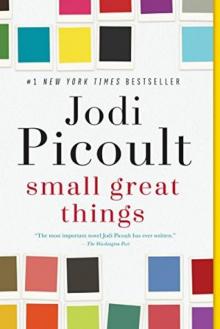 Small Great Things
Small Great Things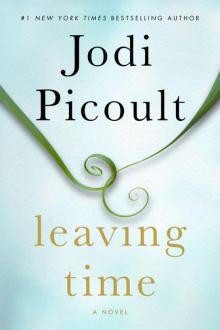 Leaving Time
Leaving Time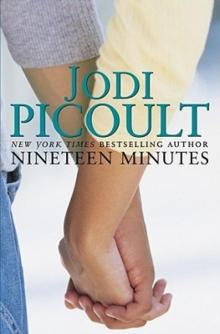 Nineteen Minutes
Nineteen Minutes Larger Than Life
Larger Than Life Perfect Match
Perfect Match My Sister's Keeper
My Sister's Keeper The Pact
The Pact Handle With Care
Handle With Care Songs of the Humpback Whale
Songs of the Humpback Whale Mermaid
Mermaid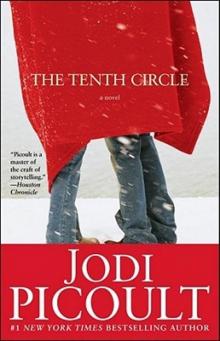 The Tenth Circle
The Tenth Circle The Color War
The Color War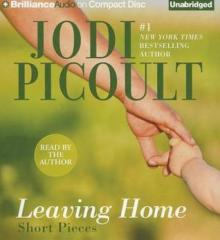 Leaving Home: Short Pieces
Leaving Home: Short Pieces House Rules
House Rules Lone Wolf
Lone Wolf The Storyteller
The Storyteller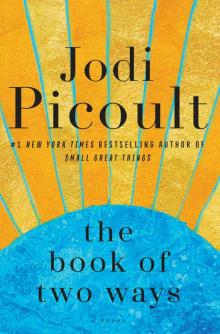 The Book of Two Ways
The Book of Two Ways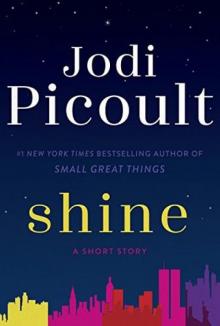 Shine
Shine Off the Page
Off the Page Sing You Home
Sing You Home Second Glance: A Novel
Second Glance: A Novel Mercy
Mercy Vanishing Acts
Vanishing Acts Between the Lines
Between the Lines Plain Truth
Plain Truth Salem Falls
Salem Falls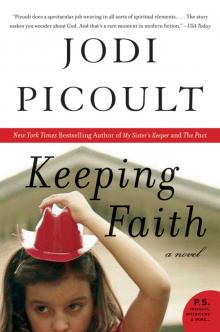 Keeping Faith
Keeping Faith Harvesting the Heart
Harvesting the Heart Change of Heart
Change of Heart Where There's Smoke
Where There's Smoke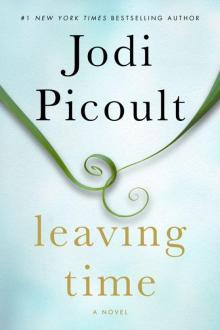 Leaving Time: A Novel
Leaving Time: A Novel Over the Moon
Over the Moon House Rules: A Novel
House Rules: A Novel The Jodi Picoult Collection #2
The Jodi Picoult Collection #2 Leaving Home: Short Pieces (Kindle Single)
Leaving Home: Short Pieces (Kindle Single) My Sister's Keeper: A Novel
My Sister's Keeper: A Novel![Mermaid [Kindle in Motion] (Kindle Single) Read online](http://i1.bookreadfree.com/i1/04/03/mermaid_kindle_in_motion_kindle_single_preview.jpg) Mermaid [Kindle in Motion] (Kindle Single)
Mermaid [Kindle in Motion] (Kindle Single) The Jodi Picoult Collection #4
The Jodi Picoult Collection #4 Sing You Home: A Novel
Sing You Home: A Novel The Jodi Picoult Collection
The Jodi Picoult Collection Lone Wolf A Novel
Lone Wolf A Novel Second Glance
Second Glance Larger Than Life (Novella)
Larger Than Life (Novella) The Jodi Picoult Collection #3
The Jodi Picoult Collection #3